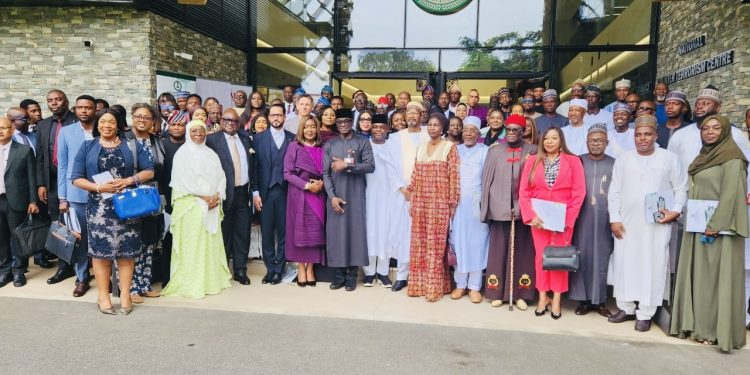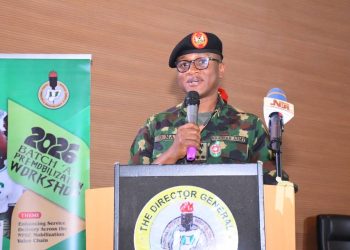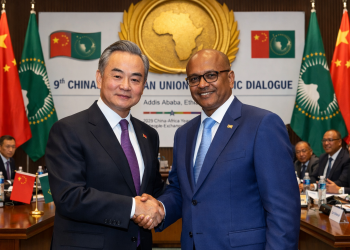By Nkechi Eze
For decades, the menace of terrorism and violent extremism has posed one of Nigeria’s gravest challenges, threatening lives, destabilising communities, stifling economic growth, and undermining the nation’s image in the eyes of the world. Beyond the tragic human toll, insecurity has crippled investments, disrupted trade, driven away foreign capital, and forced businesses to shutter in once-vibrant regions. Farmers have abandoned fertile fields, factories have scaled down operations, and banks have been unable to expand into conflict-prone communities. While government has shouldered the bulk of responsibility in addressing the crisis, it has become increasingly clear that no single actor can win this battle alone. Security is the foundation of prosperity, and without the active involvement of the private sector, the engine of commerce, innovation, and jobs, Nigeria cannot achieve lasting resilience against violent extremism. It was against this backdrop that the National Counter Terrorism Centre (NCTC), in the Office of the National Security Adviser, convened a historic high-level consultative dialogue in Abuja on Friday, August 29, 2025, bringing together business leaders, traditional rulers, policymakers, international partners, civil society, and security experts under one roof to forge new pathways for collaboration.
In his welcome remarks, the National Coordinator of the NCTC, Major General Adamu Laka, speaking on behalf of the National Security Adviser, Mallam Nuhu Ribadu, underscored the historic significance of the gathering. He noted that although the Centre had engaged stakeholders in the past, this was the first formal platform dedicated to institutionalising private sector partnership in the country’s counterterrorism architecture. Terrorism, he stressed, has become increasingly complex, transnational, and technologically sophisticated, targeting critical infrastructure from financial systems to energy facilities and logistics networks. Yet, he added, the same private sector that often bears the brunt of attacks is also uniquely positioned to drive resilience through resources, technology, and innovation. Laka reiterated the NCTC’s mandate to coordinate national efforts against terrorism and violent extremism, guided by key frameworks such as the National Counter Terrorism Strategy (NACTEST), which is currently under review and scheduled for relaunch by President Bola Ahmed Tinubu in October 2025. Anchored on four main pillars, including Preventing and Countering Violent Extremism (PCVE), the Strategy, together with a new NCTC Strategic Plan for 2025–2030, will define Nigeria’s counterterrorism posture nationally and regionally. He added that while government remains committed to expanding NCTC’s infrastructure, including a new drone station, a counterterrorism museum, an experience centre, office extensions, and additional staff accommodations, such ambitions require complementary support from the private sector. By the close of the session, he explained, the Centre expected to establish a shared understanding of the economic impact of violent extremism, generate concrete recommendations for integrating businesses into implementation frameworks, and develop a roadmap for sustained engagement that positions the private sector as co-leaders in securing Nigeria’s future.
The call for stronger collaboration resonated through subsequent presentations. Ambassador Mairo Musa Abass, Director of PCVE at the NCTC, in her presentation on securing markets and communities through private sector participation, emphasised that traditional kinetic approaches alone are insufficient to counter modern terrorism. She traced the evolution of Nigeria’s PCVE policy since 2016, noting that non-kinetic measures such as addressing grievances, promoting inclusion, and building socio-economic alternatives remain critical to long-term stability. She urged private sector involvement in implementing State and Local Action Plans, supporting grassroots initiatives, and investing in livelihoods to prevent extremist exploitation of vulnerable populations.
Reinforcing the economic dimension of insecurity, Commodore Ahmad A. Madawaki, Director of Policy and Strategy at the NCTC, delivered a paper on safeguarding business interests through strategic partnerships. He outlined how violent extremism has cost the global economy trillions of dollars and significantly undermined Nigeria’s GDP, particularly in sectors such as mining, manufacturing, agriculture, and banking. Citing examples, he noted that incidents of violence had shut down 80 percent of businesses in parts of the North-East, closed markets such as Maiduguri’s Monday Market, and caused investor flight, with the African Development Bank estimating annual GDP losses of nearly one percent due to insecurity. He presented case studies from the United States’ InfraGard programme and South Africa’s anti-money laundering task force, showing how public-private alliances can strengthen national resilience. For Nigeria, he argued, the business community cannot remain passive observers but must actively engage in intelligence-sharing, security investment, community stabilisation, and public awareness campaigns, thereby safeguarding their own interests while contributing to national stability.
Goodwill messages from partners further highlighted the urgency of collaboration. The Managing Director of TAJBank, Mr. Hamid Joda, recalled how insecurity had frustrated his bank’s expansion plans in certain communities, denying locals jobs and financial inclusion. He recounted how a Bahraini investor once lost enthusiasm about Nigeria upon hearing news of a terrorist attack, illustrating how negative perceptions undermine investment. He pledged the banking sector’s support, particularly in countering terrorist financing, stressing that banks are duty-bound to detect suspicious transactions and work with government to close loopholes.
Similarly, Ms. Beatrice Eyong, UN Women Representative to Nigeria and ECOWAS, urged that gender perspectives be mainstreamed into the review of NACTEST. She reminded participants that women and girls are disproportionately impacted by conflict through abductions, trafficking, and sexual violence, yet are often excluded from peace processes. Citing United Nations Security Council Resolution 1325 and Nigeria’s forthcoming Third National Action Plan on Women, Peace and Security, she called on the private sector to integrate gender-sensitive approaches into their counterterrorism contributions, insisting that no business can thrive amidst terrorism.
From the insurance industry, Mrs. Abimbola Onakomaiya, President of the Professional Insurance Ladies Association, reiterated that violent extremism is bad for business, undermining the very peace of mind that insurers seek to protect. She pointed to the 2020 EndSARS protests, during which the industry paid billions in claims, as evidence of resilience and commitment to national stability. She argued that insurers, beyond providing risk protection, can support recovery in conflict zones, promote awareness, and design innovative risk management solutions. She proposed collaborative initiatives such as promoting rule of law, strengthening local governments, working with faith-based organisations to counter extremist narratives, engaging the media to promote tolerance, and integrating peace education in schools and universities.
Private security expert Mr. Maher Giundi expanded on the economic impact of insecurity, describing how violence displaces millions, destroys infrastructure, and cripples agriculture, leading to food shortages, inflation, unemployment, and loss of investor confidence. He stressed that insecurity is not just a security issue but an economic crisis that robs Nigeria of its potential, urging holistic approaches that combine military response with socio-economic reforms.
Deliberations throughout the dialogue converged on key priority areas where the private sector could contribute meaningfully. These included co-funding and technical support for state and local PCVE action plans, investments in livelihoods and entrepreneurship, support for applied research and knowledge hubs, integration of PCVE-sensitive initiatives into corporate social responsibility portfolios, and partnerships in communication, awareness, and strategic media campaigns. Gender-responsive initiatives were also emphasised, ranging from workplace inclusion policies and microfinance schemes for women and youth, to scholarships, ICT hubs, and peace-focused media programming. In the humanitarian space, proposals included building learning centres and women’s shelters, supporting health and nutrition in IDP camps, and strengthening protection services for vulnerable groups. The importance of strategic communication, digital counter-narratives, monitoring, evaluation, and documentation was also highlighted as vital for sustaining momentum and measuring impact.
By the close of the Abuja dialogue, there was broad consensus that the fight against terrorism cannot be won by government alone. The private sector, far from being a passive victim, must emerge as a co-leader in driving resilience, protecting markets, fostering inclusion, and enabling prosperity. Participants reaffirmed their commitment to continued engagement, with further workshops to be convened at federal, state, and local levels following the relaunch of NACTEST and related policy frameworks in October.
The high-level dialogue thus marked a pivotal step towards a new model of counterterrorism in Nigeria, one built not just on military strength but on shared responsibility, inclusivity, and sustainable partnerships between government, business, and society.
















